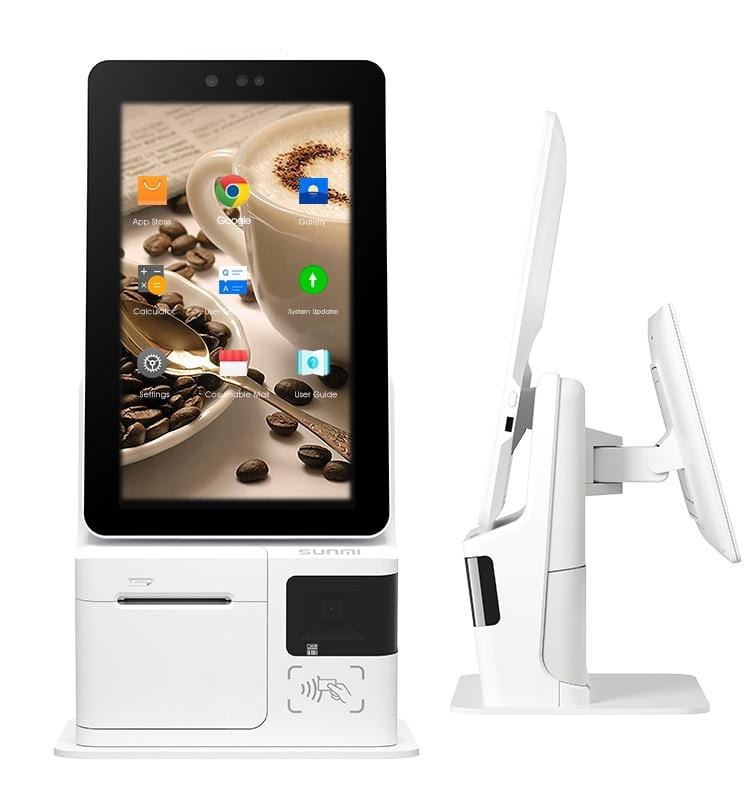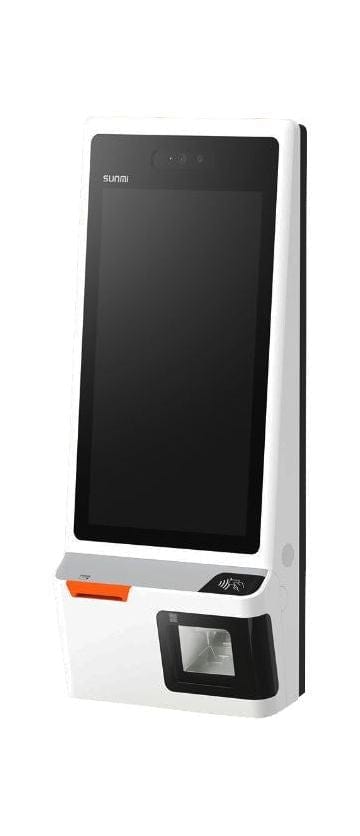Los quioscos de autoservicio se han convertido en herramientas esenciales en numerosos sectores, desde el comercio minorista hasta la sanidad, ofreciendo comodidad a los clientes y mejorando la eficiencia operativa. A medida que estos quioscos evolucionan, incorporan características que mantienen a las empresas competitivas y alineadas con las expectativas de los clientes modernos. Para empresas como Allstar Terminals, que ofrece quioscos líderes en el sector como el SUNMI K2 Kiosk , el SUNMI K2 Mini y el PAX SK800 , mantenerse al día con las nuevas tendencias es clave para ofrecer a los clientes las mejores soluciones.
A continuación se presentan algunos de los principales avances tecnológicos que están dando forma al futuro de los quioscos de autoservicio, especialmente aquellos que su empresa puede aprovechar para crear una experiencia fluida y fácil de usar.
1. Integración de pagos sin contacto para transacciones más rápidas
Los pagos sin contacto han pasado rápidamente de ser una comodidad a una necesidad en los quioscos de autoservicio. La pandemia de COVID-19 intensificó la demanda de interacciones higiénicas y sin contacto, y como resultado, los quioscos con tecnología NFC (Near Field Communication) se han vuelto muy populares. Al incorporar opciones de pago sin contacto, los quioscos ofrecen a los clientes una forma rápida y cómoda de pagar sin necesidad de usar efectivo ni pantallas táctiles.
Beneficios clave de los pagos sin contacto :
- Velocidad y eficiencia : Reduce el tiempo de transacción, permitiendo a los clientes moverse rápidamente por las filas.
- Mayor seguridad : elimina la necesidad de contacto físico, lo que resulta atractivo para los consumidores preocupados por la salud.
- Compatibilidad : admite opciones de pago como Apple Pay, Google Pay y tarjetas sin contacto, lo que aumenta la accesibilidad.
El quiosco SUNMI K2 y el PAX SK800 están diseñados con capacidades de pago sin contacto, lo que los hace ideales para tiendas minoristas, restaurantes de servicio rápido e industrias de atención médica que buscan mejorar la comodidad del cliente.
2. Interfaz de usuario y diseño mejorados para una mayor usabilidad
El diseño de la interfaz de usuario juega un papel crucial en la usabilidad y el atractivo de los quioscos de autoservicio. Los quioscos modernos están adoptando diseños intuitivos y fáciles de usar que satisfacen las necesidades de una variedad de clientes, incluyendo aquellos con conocimientos tecnológicos limitados. La tecnología de pantalla táctil se ha vuelto más ágil y las interfaces están optimizadas para simplificar el proceso de aprendizaje y evitar frustraciones.
Beneficios de una interfaz fácil de usar :
- Mejor accesibilidad : permite que los usuarios de todas las edades y capacidades naveguen fácilmente.
- Tiempos de espera reducidos : las interfaces simples permiten a los clientes completar las transacciones más rápido, lo que reduce los tiempos de espera.
- Menor necesidad de asistencia : un diseño intuitivo reduce la necesidad de soporte en el sitio, lo que facilita el manejo de tráfico elevado.
Tanto el modeloSUNMI K2 Mini como el PAX SK800 destacan por su diseño aerodinámico y su facilidad de uso, lo que los hace ideales para entornos donde la velocidad y la simplicidad son esenciales, como en comercios minoristas y restaurantes de servicio rápido.
3. Diseños de quioscos modulares y personalizables
El concepto de diseño modular ha ganado popularidad entre los quioscos de autoservicio, ya que permite a las empresas personalizarlos según sus necesidades específicas. Por ejemplo, un quiosco modular podría comenzar con una interfaz de pago sencilla y posteriormente ampliarse para incluir impresión, escaneo o pantallas adicionales a medida que evolucionen las necesidades del negocio. Esta flexibilidad convierte a los quioscos modulares en una solución rentable y escalable para empresas de todos los tamaños.
Ventajas del diseño de quiosco modular :
- Personalización : las empresas pueden agregar o eliminar componentes según los requisitos operativos.
- Actualizaciones fáciles : permite actualizaciones sin inconvenientes para satisfacer las cambiantes demandas de los clientes.
- Rentabilidad : Las empresas solo pagan por los componentes necesarios, lo que hace que los quioscos modulares sean una inversión inteligente.
El quiosco SUNMI K2 y el PAX SK800 ofrecen diseños modulares, lo que los convierte en opciones versátiles para las empresas que desean flexibilidad para ampliar la funcionalidad del quiosco con el tiempo.
4. Quioscos con IoT para compartir datos en tiempo real
La integración de la tecnología del Internet de las Cosas (IoT) en los quioscos está transformando la forma en que las empresas gestionan y supervisan su rendimiento. Los quioscos con IoT pueden conectarse a otros sistemas, lo que permite a las empresas rastrear datos en tiempo real, optimizar las operaciones y garantizar el correcto funcionamiento de los quioscos. Por ejemplo, un quiosco de autoservicio en un entorno minorista podría conectarse a un sistema de gestión de inventario para informar a los clientes sobre la disponibilidad de existencias.
Beneficios del IoT para los quioscos de autoservicio :
- Mantenimiento predictivo : los datos en tiempo real alertan a los equipos de mantenimiento sobre posibles problemas, lo que reduce el tiempo de inactividad.
- Gestión de inventario mejorada : los quioscos conectados a IoT pueden sincronizarse con bases de datos de inventario, lo que garantiza que los clientes solo vean los artículos disponibles.
- Información valiosa : los datos recopilados se pueden analizar para perfeccionar la experiencia del quiosco, haciendo que las interacciones sean más fluidas y efectivas.
El quiosco SUNMI K2 es especialmente adecuado para la integración de IoT, ya que proporciona a las empresas una forma de recopilar información útil y optimizar las interacciones con los clientes de manera efectiva.
5. Señalización digital interactiva para experiencias atractivas del cliente
Una tendencia emergente en los quioscos de autoservicio es la integración de la señalización digital, que mejora la experiencia del cliente al combinar la funcionalidad tradicional del quiosco con contenido de marketing interactivo. La señalización digital puede mostrar promociones, ofrecer productos adicionales o informar a los clientes sobre nuevos servicios. Esta doble función añade valor al quiosco, transformándolo de una simple máquina de autoservicio a una atractiva herramienta de marketing.
Beneficios de la señalización digital interactiva :
- Contenido dinámico : el contenido que se actualiza fácilmente mantiene a los clientes informados sobre nuevas ofertas y promociones.
- Oportunidades de venta adicional : incentiva a los clientes a explorar productos o servicios adicionales, lo que aumenta las ventas potenciales.
- Atrae la atención : las imágenes atractivas atraen a los clientes, lo que hace que la experiencia en el quiosco sea más interactiva.
Los quioscos PAX SK800 y SUNMI K2 están equipados para manejar señalización digital interactiva, lo que brinda a las empresas una forma de interactuar con los clientes e impulsar las ventas mientras esperan o completan transacciones.
6. Funciones de seguridad mejoradas para transacciones seguras
Con el aumento de las interacciones digitales, la seguridad es más crucial que nunca. Los quioscos ahora cuentan con funciones de seguridad avanzadas para proteger los datos de los usuarios y evitar el acceso no autorizado. El cifrado, la tokenización y los mecanismos de inicio de sesión seguro son cada vez más comunes, especialmente en los quioscos con sistema de pago.
Mejoras de seguridad clave :
- Protección de datos : Las transacciones cifradas protegen la información confidencial de las amenazas cibernéticas.
- Control de acceso seguro : las funciones de autenticación, como PIN o métodos de inicio de sesión seguros, protegen las cuentas de los clientes.
- Cumplimiento de regulaciones : los quioscos están diseñados para cumplir con los estándares de la industria, como PCI-DSS, lo que garantiza transacciones seguras.
Tanto el SUNMI K2 Mini como el PAX SK800 están diseñados para cumplir con los últimos estándares de seguridad, lo que los convierte en opciones confiables para pagos seguros y transacciones de datos en industrias como el comercio minorista y la atención médica.
Conclusión: Dando forma al futuro con los quioscos de autoservicio avanzados de Allstar Terminals
A medida que la tecnología avanza, los quioscos de autoservicio siguen evolucionando, ofreciendo funciones mejoradas que satisfacen las expectativas de los clientes modernos. En Allstar Terminals, comprendemos la importancia de estar a la vanguardia de la tecnología de quioscos. Al ofrecer modelos de alta calidad como el quiosco SUNMI K2, el SUNMI K2 Mini y el PAX SK800, permitimos a las empresas ofrecer experiencias excepcionales a sus clientes mediante funciones como pagos sin contacto, conectividad IoT, diseños modulares y seguridad mejorada.
Para las empresas que buscan aprovechar el futuro de los quioscos de autoservicio, Allstar Terminals se compromete a ofrecer las mejores soluciones del mercado. Ya sea en el sector minorista, sanitario o hostelero, nuestros quioscos están diseñados para ayudarle a ofrecer experiencias de autoservicio eficientes, atractivas y seguras.
COMPRAR SUNMI K2 MINI

COMPRAR QUIOSCO SUNMI K2
QUIOSCO SHOP PAX SK800









